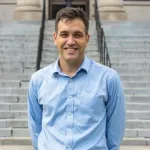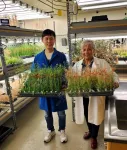(Press-News.org) UK law changes pose a threat to the security of messaging apps – and therefore their use in the NHS. In The BMJ today, doctors warn that patient care will suffer if they can no longer use apps such asWhatsApp and Signal to share information.
In March 2020, in the face of the pandemic, clinicians were officially allowed to use messaging services such as WhatsApp “where the benefits outweigh the risk,” reversing years of caution about their use in patient care – provided the apps used encryption, explains journalist Stephen Armstrong.
The most recent NHS England advice continues that policy, advising healthcare workers to use two-step verification and disable message notifications on the lock-screen.
And yet two recent pieces of legislation – one passed and one pending – threaten the use of any end-to-end encrypted messaging in the NHS.
October’s Online Safety Act instructs the UK communications regulator Ofcom to monitor user-to-user apps and software, while an amendment to the Investigatory Powers Act – expected in the spring – says technology companies can’t introduce new security software or make any significant changes to the security of their existing service without UK government approval.
What this means, in effect, is that the government will have installed surveillance of all encrypted messaging, making it impossible to be sure patient data is secure, writes Armstrong.
Not only that, but the app providers – including major tech companies such as Meta, owner of WhatsApp and Facebook, Apple and Signal – have warned that the new requirements may force them to withdraw services from the UK if it unduly impacts their ability to innovate and introduce new security features.
Marcus Baw, an emergency medicine and general practice doctor in Yorkshire, says if WhatsApp were to disappear, “we’d have an NHS wide problem immediately.”
Ross Anderson, professor of security engineering at Cambridge University, also points out that “as Signal and WhatsApp upgrade their software a number of times a week to deal with bugs or new threats, the UK would have to be treated like Burma or North Korea and simply avoided rather than wait for GCHQ approval – which could take months”.
“The combination of the IPA reforms and the online safety Act presents the possibility of a shocking level of state interference,” says Meredith Whittaker, president of Signal Foundation. “If the choice came down to adulterating the security features that allow us to keep the privacy promises we make to the people who rely on Signal in the NHS or leaving, we would leave.”
An Ofcom spokesperson told the BMJ they will use their new online safety powers “in a way that is compatible with rights to privacy and freedom of expression” and “won’t be reviewing all harmful online material or be able to read private online messages.”
But Mike Grocott, professor of anaesthesia and critical care medicine at the University of Southampton, argues that tech companies are not prepared to subject their apps to this level of government surveillance. If encrypted messaging apps withdraw from the UK, patient care would suffer, he says.
“Care is better when doctors can talk to each other,” agrees Sam Smith from patient privacy group MedConfidential. “For a range of situations doctors find themselves in, only a general app like WhatsApp is easy to use.”
For Marcus Baw, the entire problem could have been avoided if NHS IT leaders had had the vision to build an end-to-end encrypted NHS approved app linked to NHS mail.
His hope is that someone in government is going to realise the electoral foolishness of the two pieces of legislation. “The tech companies are serious,” he says. “Can you imagine the outcry from the population if WhatsApp withdraws from the UK? It would be an act of catastrophic self-harm by any government. Perhaps for once common sense will prevail.”
END
Concerns over new laws that could end use of Whatsapp in the NHS
Patient care will suffer, warn doctors
2024-01-18
ELSE PRESS RELEASES FROM THIS DATE:
Fewer than 1% of schools in England have full policies on second languages, language learning and English
2024-01-18
A tiny fraction of schools in England – about three in every 500 – have whole-school policies which address foreign languages, English usage, and integrating students who speak English as an additional language (EAL), new research indicates.
The study of almost 1,000 secondary schools, by researchers at the University of Cambridge, questions many schools’ claims to being ‘inclusive’ spaces that value the linguistic diversity of their communities. It also suggests that language learning, and an appreciation of different languages, is being deprioritised, conflicting with Government ambitions for 90% of students to study a ...
Butterflies could lose spots as climate warms
2024-01-18
Female Meadow Brown butterflies have fewer spots if they develop in warmer weather – so climate change could make them less spotty, new research shows.
University of Exeter scientists found females that developed at 11°C had six spots on average, while those developing 15°C had just three.
The findings challenge long-held scientific views about why these butterflies have varying numbers of spots.
“Meadow Browns always have large ‘eyespots’ on their forewings, probably for startling predators,” said Professor Richard ffrench-Constant, from the Centre for Ecology and Conservation on Exeter’s Penryn Campus in Cornwall.
“They ...
Infusion of bone marrow mononuclear cells results in decreased intensive care needs and white matter preservation for children with severe traumatic brain injury
2024-01-18
After children experienced severe traumatic brain injury, the infusion of bone marrow mononuclear cells derived from the patient’s own bones led to less time spent in intensive care, less intense therapy, and, significantly, the structural preservation of white matter, which constitutes about half the total volume of the brain, according to new research from UTHealth Houston.
The study, published recently in the medical journal Brain, was based on the results of a Phase II clinical trial led by first author Charles S. Cox Jr., MD, the George and Cynthia Mitchell Distinguished Chair in Neurosciences and the Glassell Family Distinguished Chair in the ...
National award goes to Sandia Labs engineer
2024-01-18
ALBUQUERQUE, N.M. — Tony Garcia often reflects on his grandfather’s words: “Work hard and be good to people, and you’ll end up happy.”
This simple principle has been Garcia’s beacon throughout his academic and professional journeys, and now has led to his recognition with a prestigious 2023 Society of Hispanic Professional Engineers STAR of Today award for technical achievement.
The STAR awards recognize individuals in STEM who are not only excelling in their fields but also making a significant impact through their work, research ...
Researchers make links between woolly mammoths and colonization of the Americas
2024-01-17
Imagine journeying back in time to the era of woolly mammoths, some 14,000 years ago. That’s what a team of international researchers from the University of Ottawa, the University of Alaska Fairbanks, McMaster University and Adelphi University, and Indigenous scholars, managed to do. Using novel high-resolution isotope profiling (a sort of “paleo-GPS”), they were able to connect the dots between the wanderings of a woolly mammoth and the earliest known human settlements in the remote ...
Governor Hochul announces CUNY to receive $75 million from the Simons Foundation, largest donation in university history
2024-01-17
Governor Kathy Hochul today announced that the City University of New York is receiving $75 million from the Simons Foundation, the University’s largest-ever donation. The gift earmarks $50 million to establish CUNY as a hub for computational science and $25 million to support CUNY’s participation in the Governor’s proposed Empire AI project. Computational science uses programming techniques to solve problems in fields such as biology, astrophysics and neuroscience.
“For many New Yorkers, higher education is critical to pursuing a career ...
Keys to aging hidden in the leaves
2024-01-17
Scientists have known about a particular organelle in plant cells for over a century. However, UC Riverside scientists have only now discovered that organelle’s key role in aging.
The researchers initially set out to understand more generally which parts of plant cells control plant responses to stress from things like infections, too much salt, or too little light. Serendipitously, they found this organelle, and a protein responsible for maintaining the organelle, control whether plants survive being left too often in the dark.
Because they had not expected this discovery, which is ...
Rain can spoil a wolf spider’s day, too
2024-01-17
If you hate the rain, you have something in common with wolf spiders.
Researchers at the University of Cincinnati found that wolf spiders can’t signal others or perceive danger from predators as easily on rain-soaked leaves compared to dry ones. Even communicating with would-be mates is harder after it rains.
The study was published in the Journal of Insect Behavior.
Biologists in UC’s College of Arts and Sciences studied Schizocosa ocreata, a wolf spider found across much of the United States. Males respond to chemical signals from females by using a combination of visual ...
Independent dispute resolution of no surprises act financially unviable for radiology
2024-01-17
Leesburg, VA, January 17, 2024—According to the American Journal of Roentgenology (AJR), the No Surprises Act’s (NSA) independent dispute resolution (IDR) process would be financially unfeasible for a large portion of out-of-network (OON) claims for hospital-based specialties—more so for radiologists than other specialists.
“Although the NSA enacted important patient protections, IDR fees limit clinicians’ opportunities to dispute payer-determined payments and potentially undermine their bargaining power in contract negotiations,” ...
AMS presidential forum to address “Climate Science as Service to Society”
2024-01-17
[Boston, MA—January 17, 2024] The American Meteorological Society (AMS) will open its 104th Annual Meeting with a Presidential Forum on how to advance society’s acceptance and use of climate science. Distinguished atmospheric scientist Dr. Kerry Emanuel will moderate a “fireside chat” with Monica Medina, President and CEO of the Wildlife Conservation Society and former Deputy Assistant Secretary at the State Department, and Bob Inglis, Executive Director of RepublicEn.org and former congressman from South Carolina. The Forum, with opening remarks by AMS President ...
LAST 30 PRESS RELEASES:
Striking genomic architecture discovered in embryonic reproductive cells before they start developing into sperm and eggs
Screening improves early detection of colorectal cancer
New data on spontaneous coronary artery dissection (SCAD) – a common cause of heart attacks in younger women
How root growth is stimulated by nitrate: Researchers decipher signalling chain
Scientists reveal our best- and worst-case scenarios for a warming Antarctica
Cleaner fish show intelligence typical of mammals
AABNet and partners launch landmark guide on the conservation of African livestock genetic resources and sustainable breeding strategies
Produce hydrogen and oxygen simultaneously from a single atom! Achieve carbon neutrality with an 'All-in-one' single-atom water electrolysis catalyst
Sleep loss linked to higher atrial fibrillation risk in working-age adults
Visible light-driven deracemization of α-aryl ketones synergistically catalyzed by thiophenols and chiral phosphoric acid
Most AI bots lack basic safety disclosures, study finds
How competitive gaming on discord fosters social connections
CU Anschutz School of Medicine receives best ranking in NIH funding in 20 years
Mayo Clinic opens patient information office in Cayman Islands
Phonon lasers unlock ultrabroadband acoustic frequency combs
Babies with an increased likelihood of autism may struggle to settle into deep, restorative sleep, according to a new study from the University of East Anglia.
National Reactor Innovation Center opens Molten Salt Thermophysical Examination Capability at INL
International Progressive MS Alliance awards €6.9 million to three studies researching therapies to address common symptoms of progressive MS
Can your soil’s color predict its health?
Biochar nanomaterials could transform medicine, energy, and climate solutions
Turning waste into power: scientists convert discarded phone batteries and industrial lignin into high-performance sodium battery materials
PhD student maps mysterious upper atmosphere of Uranus for the first time
Idaho National Laboratory to accelerate nuclear energy deployment with NVIDIA AI through the Genesis Mission
Blood test could help guide treatment decisions in germ cell tumors
New ‘scimitar-crested’ Spinosaurus species discovered in the central Sahara
“Cyborg” pancreatic organoids can monitor the maturation of islet cells
Technique to extract concepts from AI models can help steer and monitor model outputs
Study clarifies the cancer genome in domestic cats
Crested Spinosaurus fossil was aquatic, but lived 1,000 kilometers from the Tethys Sea
MULTI-evolve: Rapid evolution of complex multi-mutant proteins
[Press-News.org] Concerns over new laws that could end use of Whatsapp in the NHSPatient care will suffer, warn doctors





